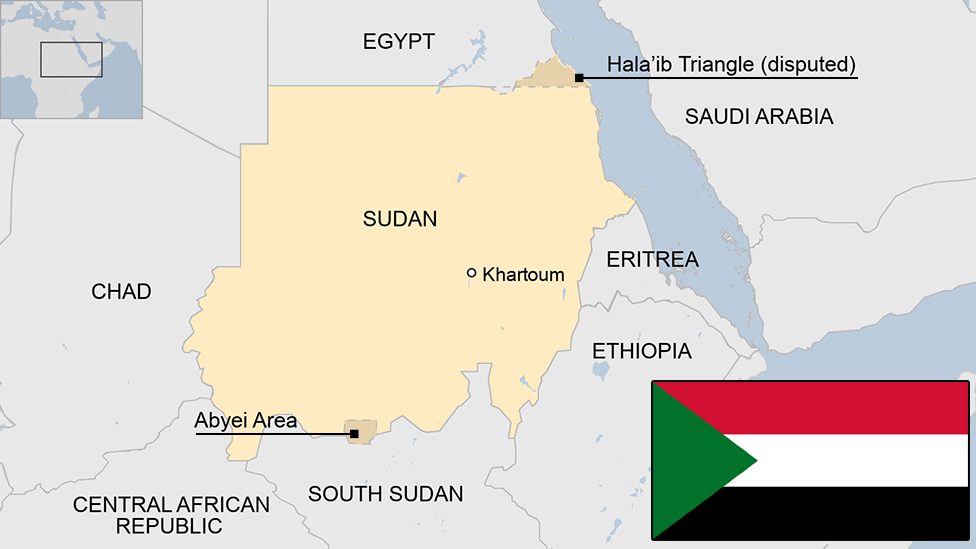Sudan crisis: Return of the feared Janjaweed
- Published
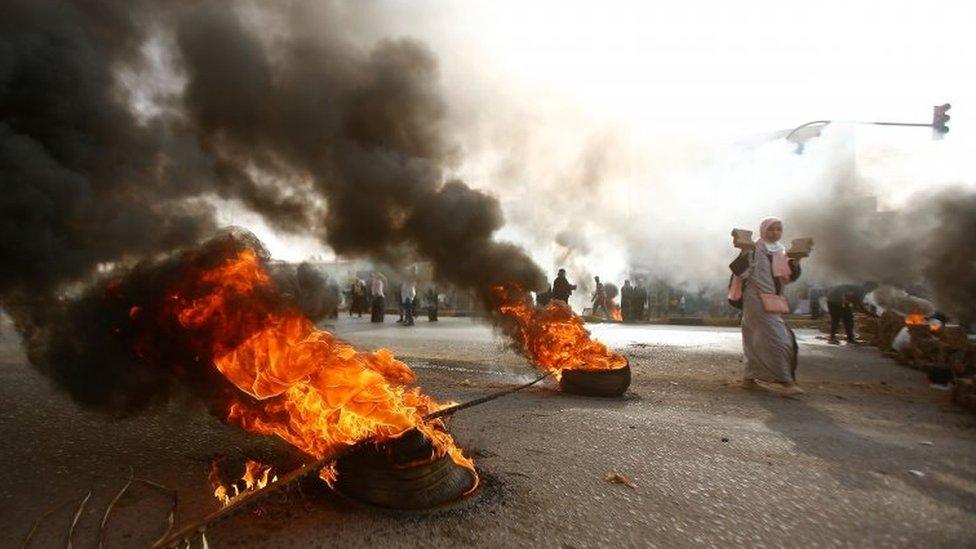
Protesters set ablaze tyres to try to stop Sudan's security forces on Monday
Sudan's military has faced mounting international condemnation for its violent attack on protesters which reportedly left at least 30 dead. But there were clear signs this was likely to happen.
Even when the crowds were at their largest and most joyous there was a sense of looming danger.
You did not have to walk far from the sit-in to encounter the Rapid Support Forces (RSF) lounging on their pick-up trucks.
Unlike the regular army these militiamen rarely responded to greetings or if they did it was with a non-committal nod, no hint of a smile.
It did not surprise me.
I remembered them from Darfur 14 years before. There they were known as the Janjaweed and became notorious for atrocities inflicted on the civilian population.
In 2005 I saw them beat and terrorise civilians in a camp for the displaced and I interviewed the survivors of torture and rape.
Now they have brought their violence to the streets of the capital.
Sudan military attacks protesters
Sudan has been driven backwards by the conspiracy of a military elite whose priority is the survival of their power and privilege.
The Transitional Military Council has scrapped the agreements reached with the opposition Forces of Freedom and Change (FFC) under the guise of speeding up the transition to full democratic elections.
These are to be held within nine months.

More on Sudan

The plan is more than likely a fiction, not designed to produce civilian rule or anything like it.
There is ample precedent in Africa and elsewhere these days for elections which go through the motions of democracy but deliver none of its substance.
Don't be surprised to see senior figures from the TMC "retiring" from the military and standing as civilian candidates.
What will not change is military control of Sudanese life.
In part the FFC and its civil society allies are victims of their own dizzying success in the early days of the revolution.
Within 24 hours they toppled President Omar al-Bashir and the military man who led the coup against him.
Thirty years of rule appeared to have been vanquished.
The sight of the sit-in drew activists from all spheres of Sudanese life. It became a citadel of freedom.
The atmosphere was intoxicating.
People debated and sang and produced art.
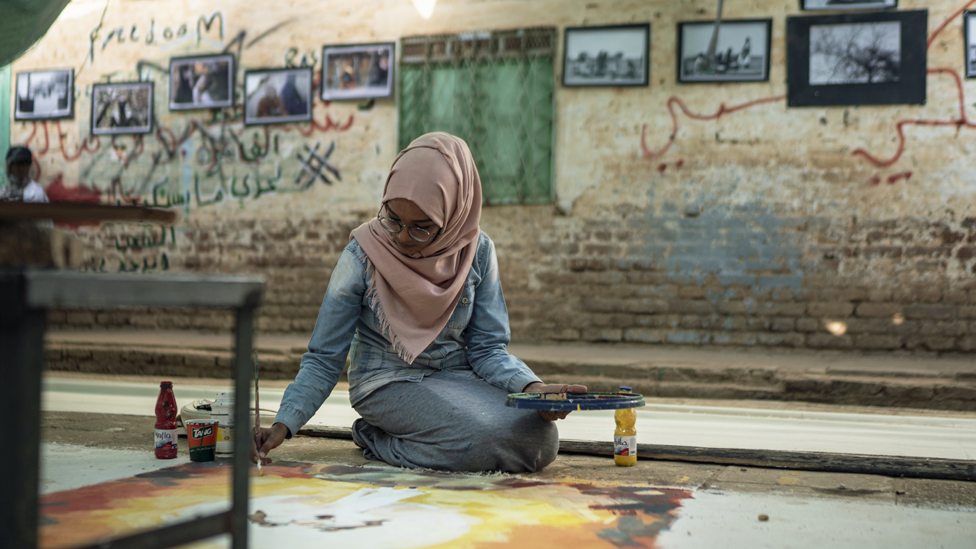
They produced manifestos on women's rights, media freedom, justice and the economy, and much more besides.
Yet diversity was also a vulnerability.
Everybody agreed that civilian rule was the essential demand.
But there were inevitable differences over the specifics of achieving that aim: what should the timeframe be, what would be the balance between military and civilian representatives, which personalities representing which groupings would take positions in any transitional arrangements?
None of these debates were in themselves fatal to the cause.
But they highlighted the difficulties of being a "people's movement" compared to an established political party with the structures and internal discipline to make swift changes at the negotiating table.
Hard line take control
There was another problem.
As the shockwaves of Mr Bashir's overthrow dissipated the old politics of Sudan re-emerged.
Parties and personalities who had been suppressed under dictatorship were determined not to be left out if political power was being shared.
This allowed the military to characterise the protesters as simply one of the groups who were part of the negotiations, ignoring the fact that there would have been no negotiations without the demonstrations.

Road to transition

19 December 2018 - Protests erupt after fuel and bread price rises announced
22 February 2019 - President Bashir dissolves the government
24 February - Protests continue as security forces respond by firing live bullets
6 April - Activists begin sit-in at military headquarters, vowing not to move until Mr Bashir steps down
11 April - Army generals announce that Mr Bashir has been toppled but sit-in continues as people demand civilian rule
20 April - Talks between the military rulers and civilian representatives begin
13 May - Shooting outside the military headquarters leaves six people dead
14 May - Military and civilians announce a deal on a three-year transition period
16 May - Talks postponed as military demands some barricades are removed
3 June - Activists announce the suspension of talks with the military, accusing them of using force to disperse their sit-in

Delaying or dissembling in the name of inclusivity became a tactic.
Once the military had recovered from the confusion around Mr Bashir's overthrow it regrouped and the most hard line elements took control.
This explains the pre-eminence of the RSF commander, Mohammed "Hemeti" Hamadan whose personal ruthlessness in Darfur always made him the most likely leader of a counter-revolution.
Unlike many of the military elite "Hemeti" is an outsider.
From a rural background he has no family ties or sentimental affiliation with the young middle class protesting on the streets of the Khartoum.
Divided world
The military also enjoys another big advantage.
This is an age of international division.
The notion of an "international community" which might pressure the regime is a fantasy.
The world is now governed by a collection of interests - occasionally they are complementary, more often they are in competition.
The UN Security Council is not a forum where any kind of concerted action on Sudan might be approved.
Russia and China would block any move to increase sanctions on Khartoum.
The condemnation from US National Security Advisor, John Bolton - he called the Khartoum violence "abhorrent" - will only mean something if the US demands that its regional allies - Egypt, Saudi Arabia and the United Arab Emirates - exert pressure on the Sudanese military.
For now it is hard to imagine President Donald Trump picking up the phone to Cairo or Riyadh and insisting on a swift transition to civilian rule.
Mr Trump has other priorities like the Mexican border, Venezuela, Iran and the trade war with China.
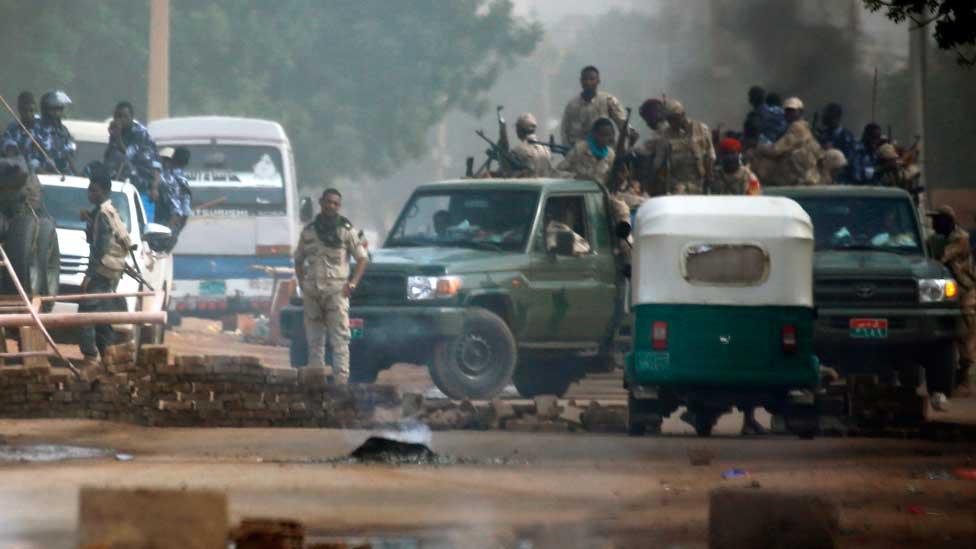
Sudanese forces tried to disperse the sit-in on Monday
What about an African solution?
The African Union (AU) was an early supporter of civilian rule after the fall of Mr Bashir but the AU's actions around the election results in the Democratic Republic of Congo in January are cautionary: the AU first criticised what many observers saw as a fix but then rowed back.
In recent weeks the African body has spoken of the need for international actors not to meddle in Sudanese affairs.
Bear in mind too that the AU's current chairperson is Egypt's President Abdel Fattah el-Sisi who is himself a symbol of military usurpation of power.
The Sudan crisis exposes the dominant reality of the international scene.
Force can have its way without consequence if the killers and torturers represent a valuable enough asset to other stronger powers - in strategic, ideological, intelligence or economic terms.
It is possible that President Trump will make a stand on Sudan and pressure his allies to act, that the AU will threaten to expel and isolate Sudan, that more moderate elements in the military will emerge and challenge "Hemeti" and his supporters. Possible. But certainly not probable.
I remember speaking with a leading activist at the demonstrations back in April.
He told me that "the sit-in is the only card we have. That is why we have to maintain it."
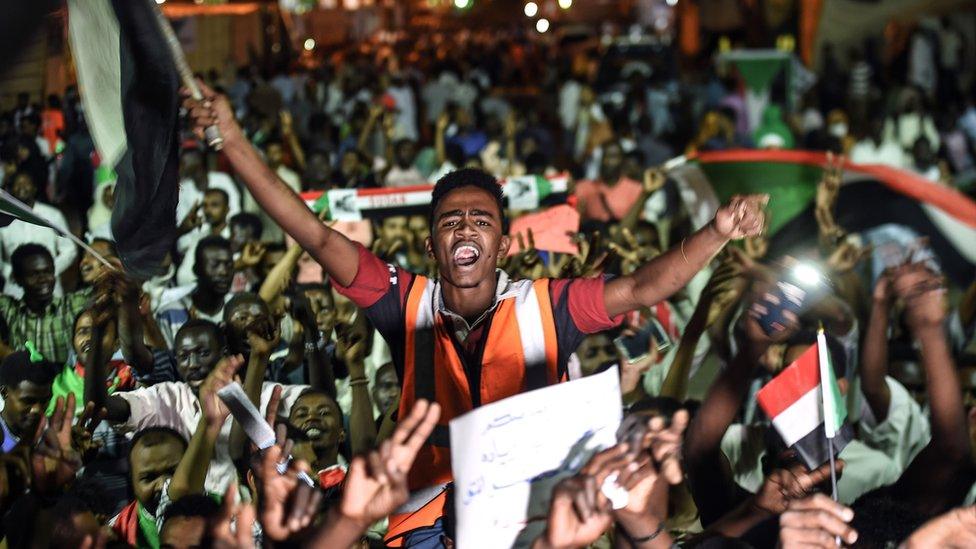
Sudanese people had been protesting for many weeks by this point in May, well after Mr Bashir had been forced out of office
But now that the sit-in is smashed where does the opposition go?
The peaceful revolutionaries are beaten and traumatised.
It is impossible to say now whether the Forces of Freedom and Change can come back as a street-driven force.
There have been calls for civil disobedience and strikes.
Any such will likely be met with ruthless violence.
What will not change, in fact what has been deepened, is the alienation of people from their rulers.
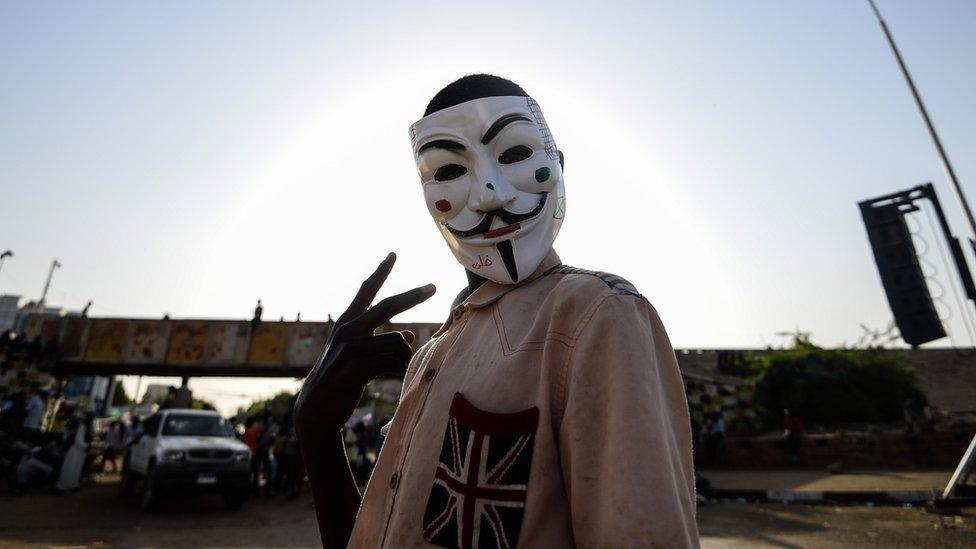
Demonstrators were still protesting peacefully at the beginning of May at a sit-in outside the army's headquarters
Repression may work as a strategy for now but not indefinitely.
Sudan is now dependent on powerful neighbours for its economic survival and beset by internal divisions.
Dependency on the Egyptians and Saudis will rankle with many Sudanese beyond the protesters, adding a more overtly nationalist dimension to the current crisis.
The generals have succeeded in smashing the protest but their troubles may only be starting.
- Published3 June 2019
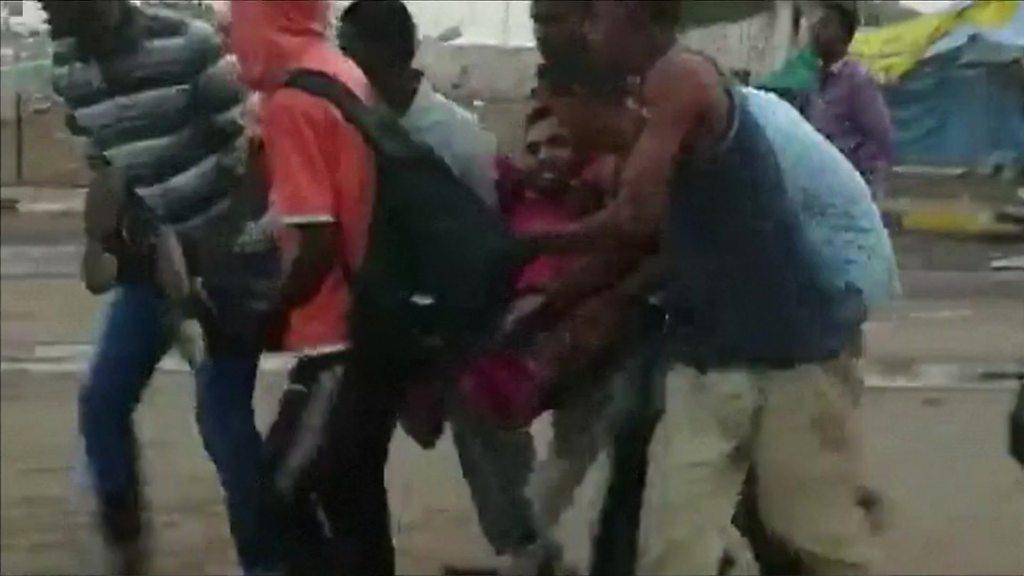
- Published3 June 2019
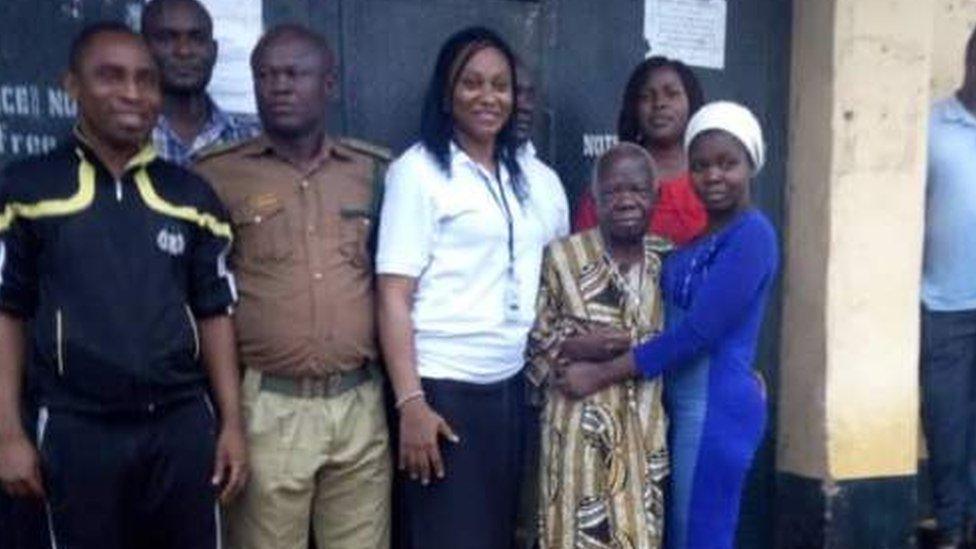
- Published14 May 2019
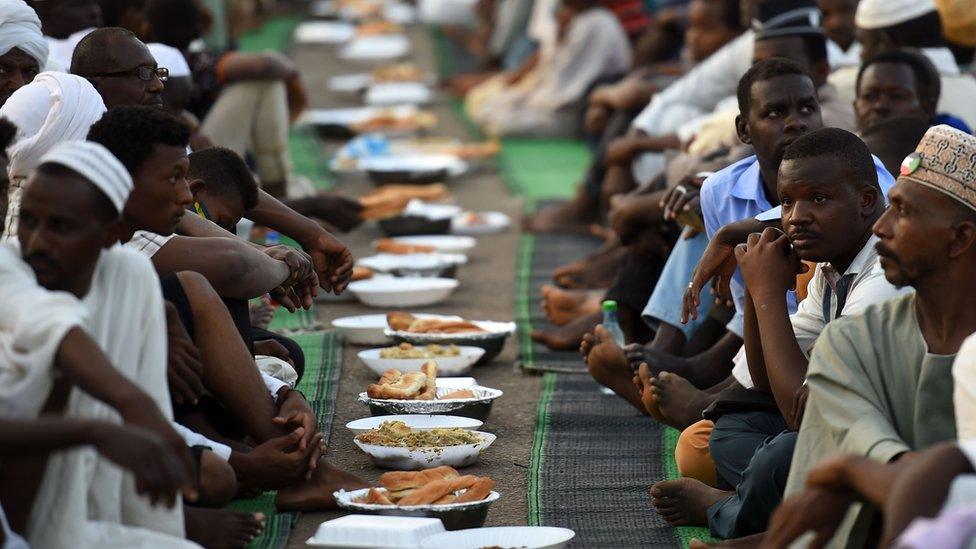
- Published18 January 2019
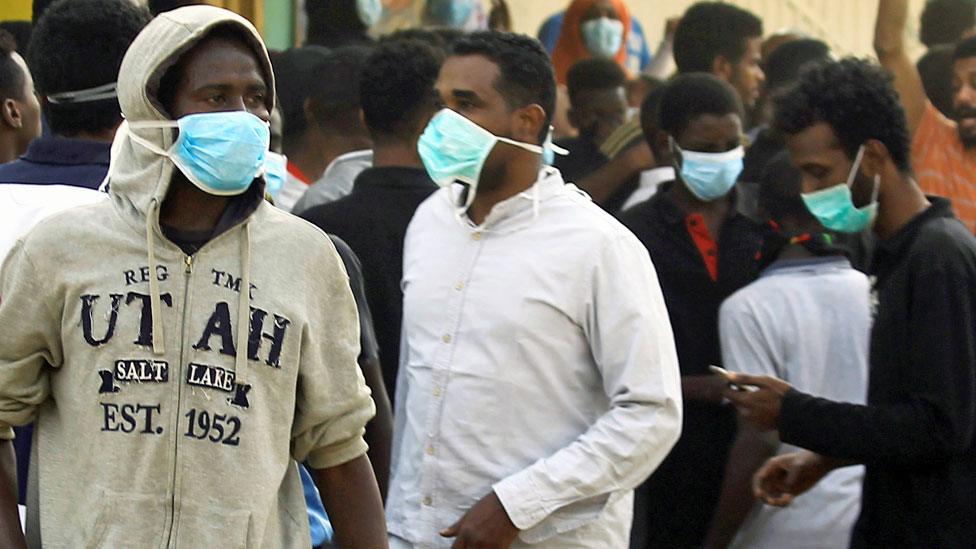
- Published5 May 2019
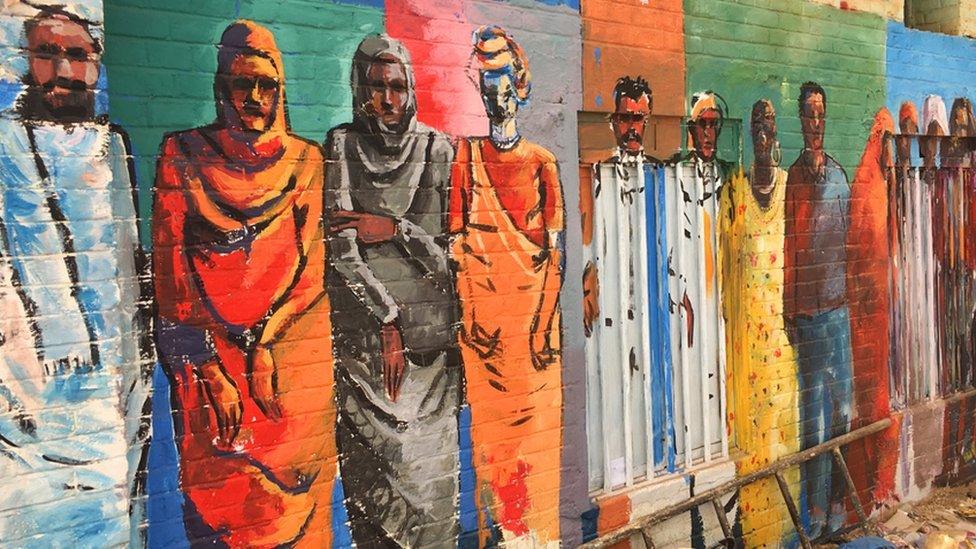
- Published14 August 2019
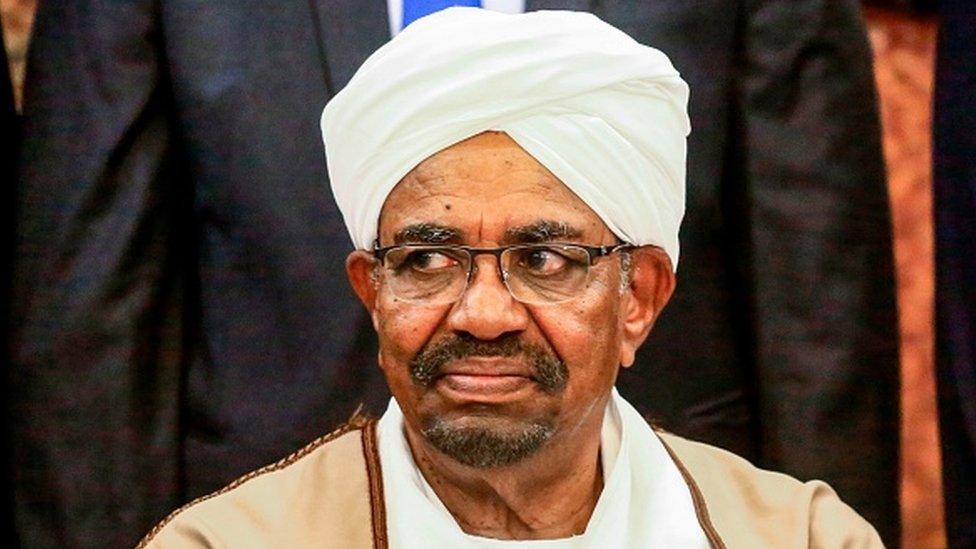
- Published13 September 2023
